PLEASE NOTE:
While the following article relates to your Google search, the services and methods at Goodwin Hypnosis may differ from those mentioned below. Since 2007, we have helped thousands of clients to overcome emotional and behavioral challenges when all else had failed. According to many of them (and their referring healthcare providers), our methods are faster than talk therapy, easier than willpower, and safer than medication. If you’re ready to resolve your issues, skip the article and visit the rest of our website, where you can learn about our unique approach, watch client testimonial videos, and discover how working with us one-on-one could be the solution you’ve been searching for.
We can help you with a variety of issues relating to emotional trauma. While we don't diagnose disorders like PTSD, we have helped hundreds of clients to overcome a wide range of traumatic experiences and their negative effects with methods that are more efficient and comfortable than CBT or EMDR. If you would like to learn more about working with us one-on-one to clear your trauma, click here.
Introduction
Driving anxiety is a common yet often misunderstood challenge that affects a significant portion of the population. Estimates suggest that anywhere from 10% to 20% of individuals experience varying degrees of anxiety when it comes to driving, with some reporting intense fear that can lead to overwhelming panic. This emotional struggle is not just a personal issue; it resonates with countless others who share similar experiences, creating a tapestry of shared fears and vulnerabilities.
As individuals navigate the complexities of their feelings, understanding the roots of this anxiety becomes essential for healing. Fortunately, therapeutic approaches such as hypnotherapy and cognitive-behavioral techniques offer promising pathways to reclaim confidence behind the wheel. By addressing both the psychological underpinnings and the conditioning that fuels this fear, individuals can embark on a journey toward empowerment and freedom, transforming their relationship with driving and enhancing their overall quality of life.
Understanding the Prevalence of Driving Anxiety
Driving anxiety is a challenge that impacts a significant portion of the population, with research indicating that between 10-20% of people experience some level of anxiety regarding driving. Specifically, a survey revealed that 7% of those who primarily drive on motorways report feeling anxious. This anxiety can range from mild unease to severe panic attacks, leaving many feeling overwhelmed.
Conversations on sites such as Quora unveil a tapestry of common experiences, illustrating that numerous people struggle with similar concerns. One expert notes, 'Understanding that these feelings are not unique is crucial; they represent a genuine concern rather than a personal shortcoming.' This shared experience highlights the necessity to acknowledge driving-related stress and motivates people to pursue effective solutions.
At Goodwin Hypnosis, board-certified hypnotists Todd and Gina Goodwin, who are also Master Practitioners of NLP, utilize their expertise to assist clients in overcoming their challenges. As one client shared, 'After experiencing a traumatic loss, I was deep in grief and experiencing symptoms of PTSD that were preventing me from functioning at a healthy level in my daily life... Through innovative techniques, I was completely cleared of the residual PTSD symptoms, and my quality of life increased.'
Another client stated, 'I contacted the Goodwin Hypnosis after reading glowing reviews online and not having any success with my stress using the typical therapy options. After just a few sessions, I noticed more improvements than I had over the past 6 months.' These experiences illustrate the transformative impacts of hypnotherapy in addressing nervousness and emotional recovery.
For example, Todd and Gina employ various methods similar to Virtual Reality Exposure Therapy, enabling people to gradually confront their fears in a controlled setting with professional support, which can be especially helpful for those with concerns about operating a vehicle. The profound changes experienced by clients like Vanessa Vergnetti, who stated, 'I didn't feel re-traumatized during the trauma work... it was incredibly transformative and life-changing,' highlight the potential for hypnosis to assist those suffering from fear associated with operating a vehicle.
Recognizing that many others face this challenge can provide solace and foster a sense of community and support. With the right guidance and tools, individuals can regain their confidence and enjoy the freedom of operating a vehicle once again.
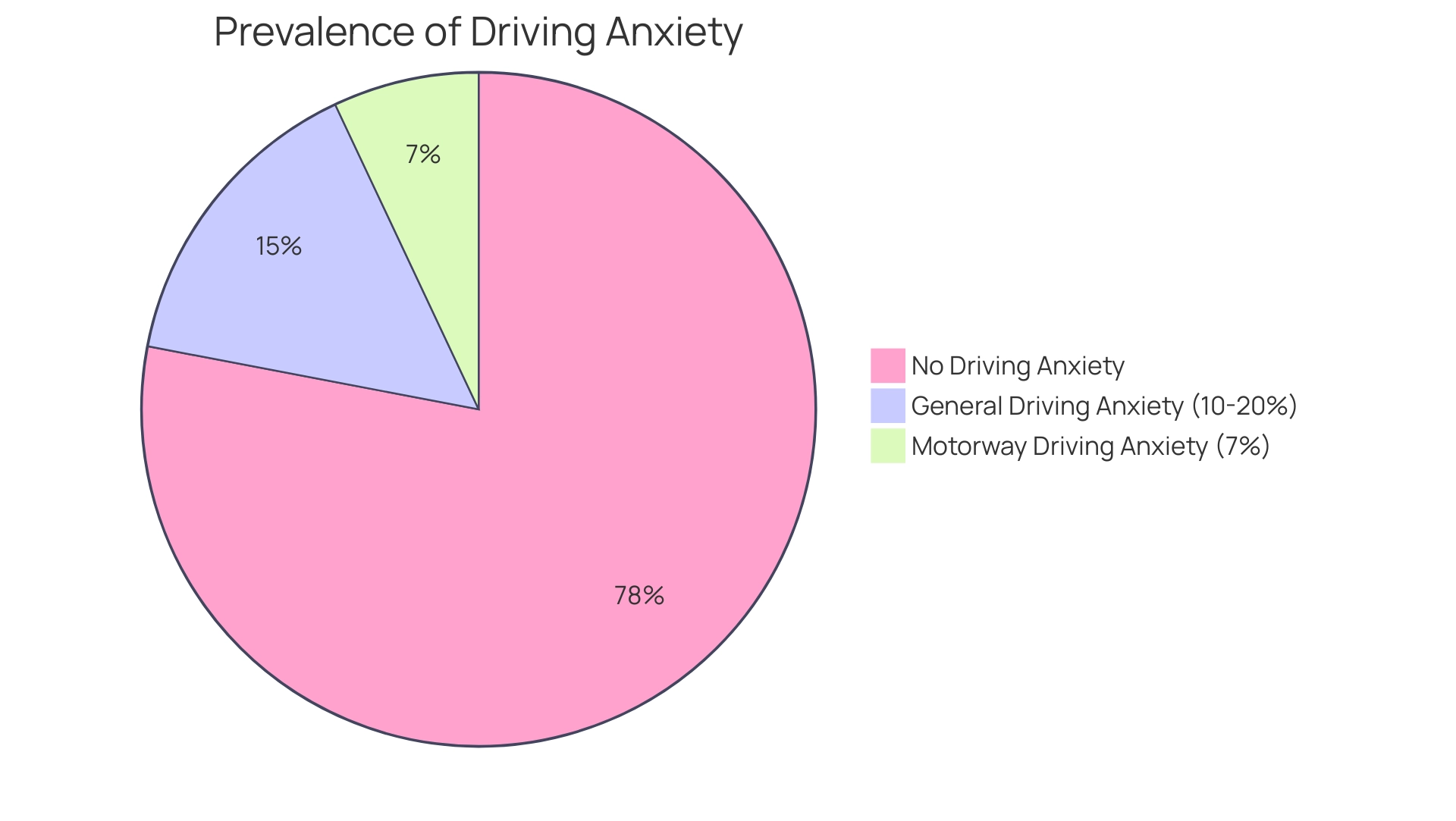
Exploring the Psychological Roots of Fear in Driving
Driving anxiety often stems from a complicated blend of personal experiences and psychological influences. Traumatic incidents—such as accidents or near-misses—can leave indelible marks, triggering persistent fear responses that may manifest during later situations on the road. Research indicates that certain mental disorders can significantly affect the likelihood of road incidents, reinforcing the connection between psychological well-being and performance behind the wheel. For example, research indicates that around 40% of people who undergo traumatic vehicular events develop anxiety-related symptoms, underscoring the prevalence of this issue.
Cognitive distortions, like catastrophizing, further fuel this anxiety by leading individuals to envision the worst-case scenarios. For numerous individuals, a lack of confidence in their abilities or an overwhelming anxiety of losing control can heighten their apprehension. It’s crucial to recognize that these fears are not irrational; they are often grounded in past experiences and learned behaviors. As Ghazal Sepahbodi insightfully notes, "The results revealed that some mental disorders affect the incidence of road collisions."
Additionally, gender differences play a significant role, as studies indicate that women tend to report higher levels of anxiety while behind the wheel compared to men, thereby influencing their behaviors and responses to stress. Understanding these psychological roots is fundamental for trauma resolution seekers, as it opens the door to healing.
Moreover, current research examining life stress history and accident-related factors underscores the importance of these elements in shaping anxious driving behaviors. Powerful techniques such as hypnosis and cognitive-behavioral approaches, illustrated by the testimonials from clients at Goodwin Hypnosis, show how people can reframe their thoughts and experiences. For instance, Tara Emerson shared how her panic attacks transformed into calmness through hypnosis, while Gene Shapiro noted how understanding the roots of his panic attacks helped him regain control during stressful situations.
By addressing these underlying factors through hypnosis and NLP, individuals can embark on a path toward reclaiming the joy of operating a vehicle and building their confidence behind the wheel. Furthermore, understanding the nature of trauma—whether from accidents, personal experiences, or even chronic stress—can significantly enhance the efficacy of therapeutic interventions. Hypnotherapy and NLP not only assist in addressing the symptoms of stress but also target the root causes, allowing for a more holistic approach to treatment.
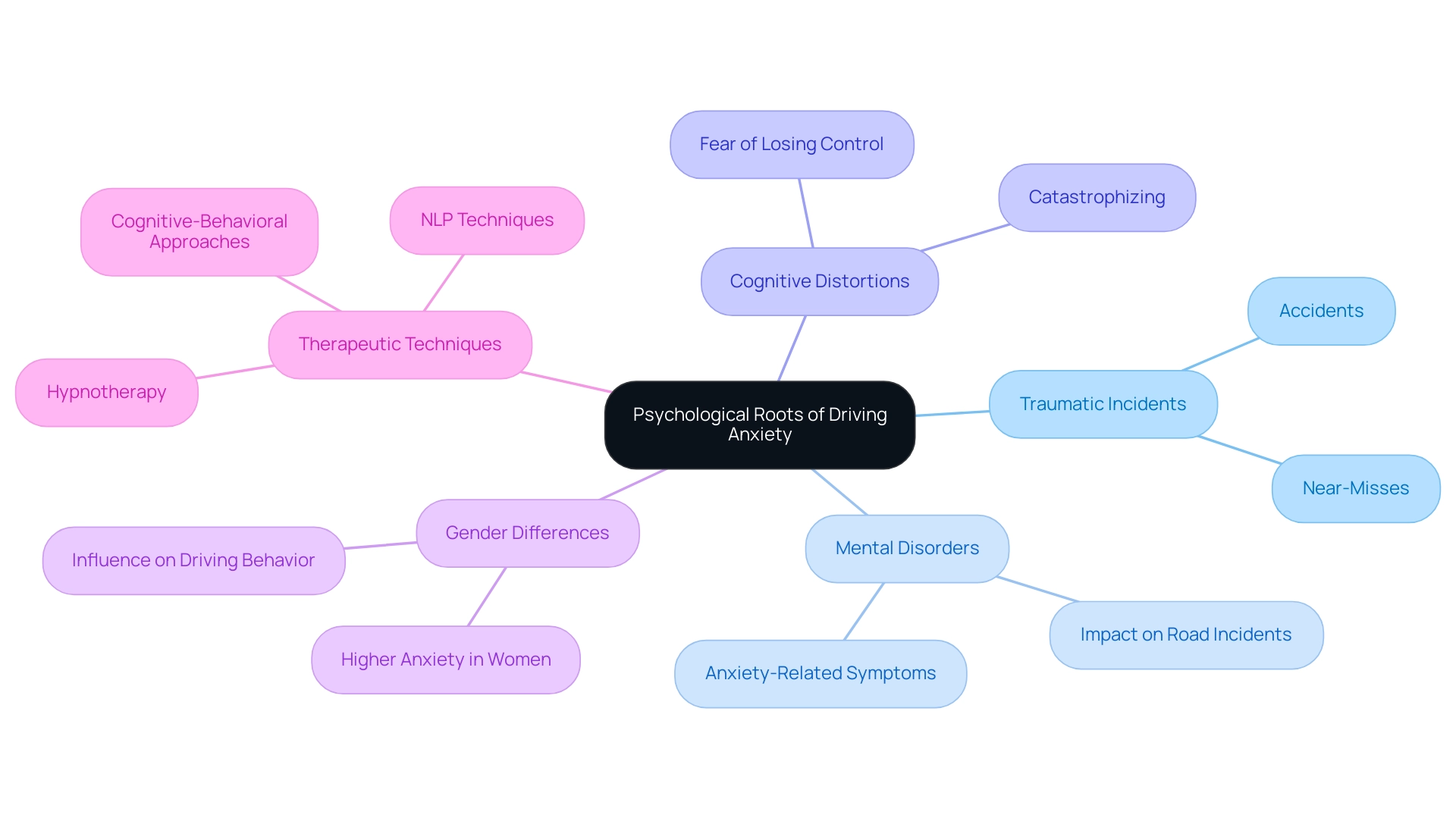
The Role of Conditioning and Past Experiences
The emergence of vehicular apprehension is frequently intricately connected to classical conditioning, a psychological occurrence where particular experiences provoke an elevated fear reaction. For example, people who have gone through distressing vehicular incidents, like traffic collisions, may connect the act of operating a vehicle with increased stress. This conditioned response can manifest in various ways, creating a barrier to safe travel. Research indicates that the mean Driving Stress Scale (DRAS) score among university students reporting traffic collision involvement is 7.64, with a standard deviation of 8.88, highlighting the quantitative measure of vehicle-related stress in this demographic. Moreover, it has been reported that an overwhelming majority of individuals seeking treatment acknowledge enduring distress related to driving tasks, with estimates suggesting that over 90% of cases experience considerable worry. This statistic serves as a testament to the widespread nature of driving-related anxieties.
Furthermore, operant conditioning can further entrench these fears. When an individual refrains from operating a vehicle and then experiences relief from their stress, this reinforcement can create a cycle of avoidance, making it progressively harder to face the fear. Recent findings indicate that those with motor vehicle accident-related PTSD display higher levels of heightened safety behaviors and performance deficits based on fear compared to their counterparts, suggesting that the influence of previous experiences on fear related to operating a vehicle is significant.
Expert insights emphasize the importance of understanding these conditioning mechanisms, as they provide a pathway toward recovery. As Joshua D. Clapp notes, "Research indicates the overwhelming majority of individuals presenting for treatment acknowledge enduring driving-related tasks with elevated or extreme distress, with some estimates exceeding 90% of cases." This acknowledgment is pivotal in recognizing the challenges faced by trauma resolution seekers.
Fortunately, an online emotional trauma recovery program led by board-certified hypnotists Todd and Gina Goodwin offers a transformative approach. By employing hypnosis and NLP, their approach addresses the underlying issues of road-related stress at the subconscious level, enabling clients to face and conquer their apprehensions. Specific techniques include:
- Guided imagery and visualization exercises, which help clients reframe their experiences and reduce anxiety.
- Rewind Technique and IEMT, which rapidly dissolve the emotional charge from upsetting or traumatic memories.
Real-world examples demonstrate how individuals have successfully managed their anxieties related to operating vehicles through structured exposure and gradual desensitization, often with the compassionate assistance of trained professionals. With support and understanding, trauma resolution seekers can learn to confront their fears, ultimately leading to a more confident and empowered experience on the road. Testimonials from clients like Vanessa Vergnetti, who shared, "Doing hypnosis and NLP with Todd was actually fun... It was incredibly transformative and life-changing," demonstrate the effectiveness of this program. Additionally, the Goodwins serve clients online using Zoom from Cary, Raleigh, Durham, and around the world, ensuring that geographical limitations do not hinder access to their life-changing program.
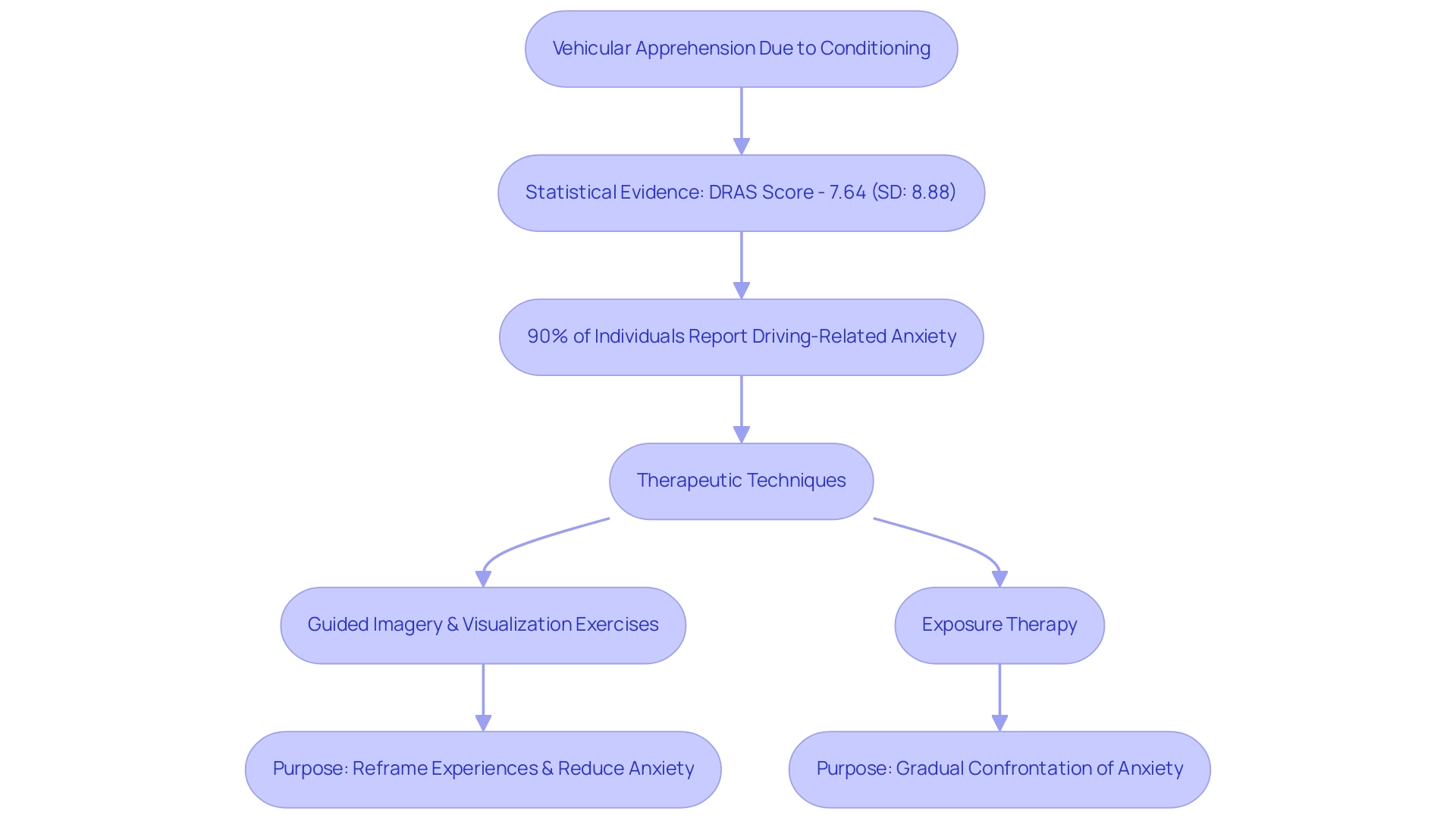
Coping Strategies and Therapeutic Approaches
Handling vehicular stress includes a combination of effective coping techniques and therapeutic measures that can provide relief and empowerment. One-on-one sessions with board-certified hypnotists, such as those available at Goodwin Hypnosis, offer tailored assistance for people aiming to conquer emotional trauma and stress.
Cognitive-behavioral therapy (CBT) stands out as a powerful tool, enabling individuals to recognize and confront the negative thought patterns that often accompany fears related to operating a vehicle. Recent studies have shown varied response rates for CBT, with effectiveness rates for related disorders ranging from 38% for obsessive-compulsive disorder to 82% for body dysmorphic disorder, underscoring its potential in treating driving-related concerns.
Mindfulness techniques are another valuable asset; they promote a present-focused mindset that can reduce distress by fostering awareness and acceptance of one's feelings in the moment. Additionally, hypnotherapy serves as a transformative pathway to deep relaxation, helping to unlock and address subconscious fears that may hinder one's ability to drive comfortably.
A pertinent case study contrasting acceptance and refusal rates of virtual reality exposure therapy to in vivo exposure shows a greater preference for VR exposure among patients with particular phobias, indicating that such innovative methods could also be advantageous for those with fear of operating vehicles.
For practical implementation, gradually exposing oneself to vehicular situations—beginning with familiar routes and progressively tackling more challenging scenarios—can significantly bolster confidence. By integrating these varied methods into everyday life and collaborating with experts like Todd and Gina Goodwin, individuals can achieve significant improvement in handling their nervousness while on the road.
Take the first step toward your recovery today by contacting Goodwin Hypnosis and regaining control of your life on the road.
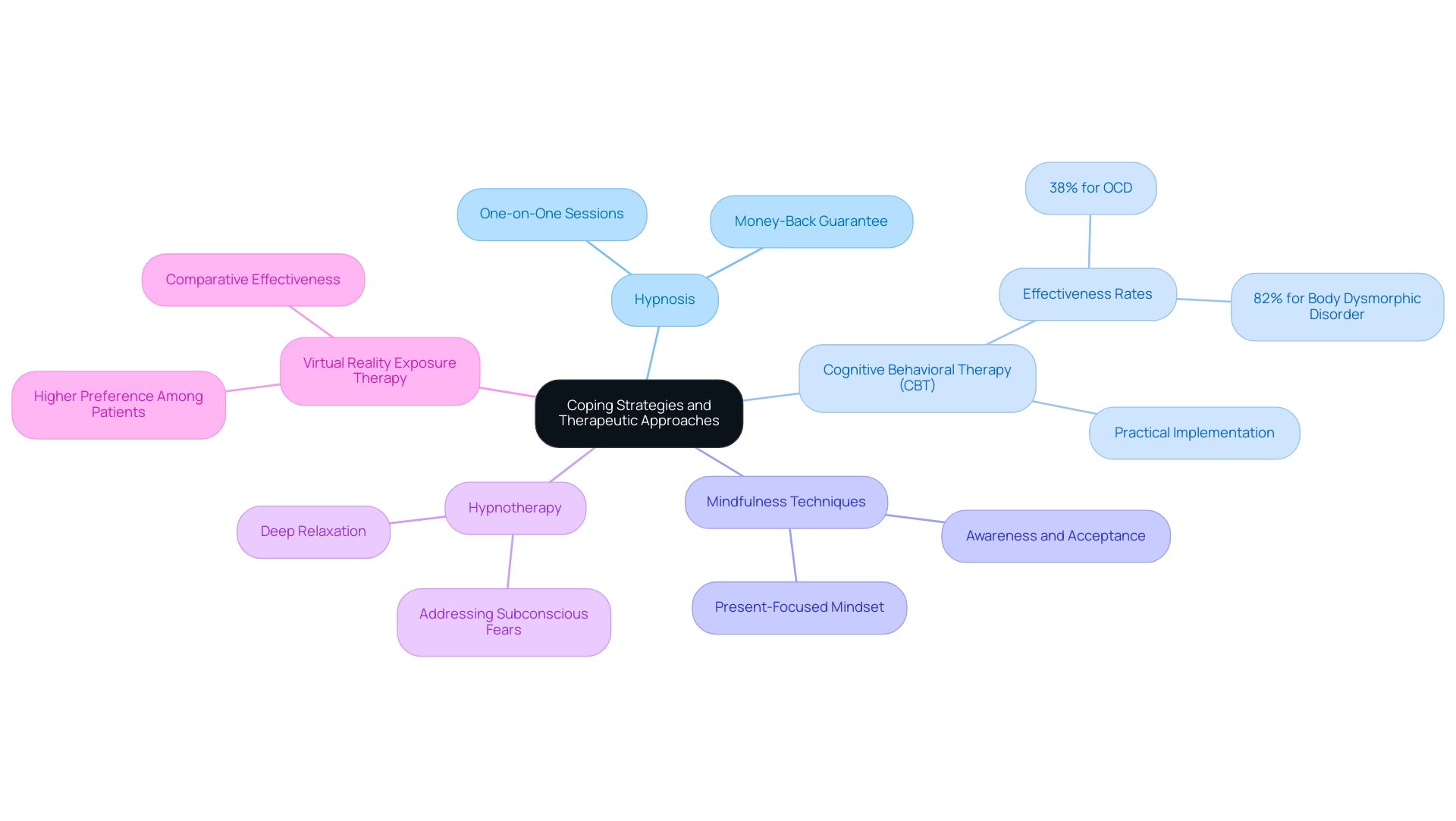
The Importance of Support Systems
A robust support system can be a cornerstone in the journey to overcome anxiety related to operating a vehicle. The encouragement and companionship provided by friends and family during driving practice can significantly alleviate feelings of isolation associated with these fears. As highlighted by Craig Thomas from the CDC, social connections are vital for mental health, especially for those facing challenges in their lives.
Support groups, like 'Driving Anxiety Support Network' and 'Fearless Driving Group,' whether conducted in-person or via online platforms, foster a welcoming atmosphere where participants can freely share their experiences and coping strategies. Dr. Mitchell notes that connecting with others who have navigated similar obstacles is essential, as it not only normalizes their experiences but also fosters a sense of belonging and community.
This connection is particularly significant given recent findings that indicate 32.1% of cisgender respondents reported feelings of loneliness, with even higher rates among transgender people. In the context of hypnotherapy, many clients have experienced transformative outcomes specifically related to their concerns about operating a vehicle; for instance, one individual shared that after just a few sessions with Todd Goodwin, they felt a profound sense of peace and happiness regarding their apprehension about using a car, stating, 'the panic attacks are now substituted by reasoning and a calm.'
Another client observed that they achieved greater advancement in handling their stress related to operating a vehicle in four weeks than in the preceding six months with conventional therapy. These testimonials highlight the essential requirement for support systems, particularly in managing stress, where sensations of isolation can worsen concerns.
By nurturing these relationships and participating in support networks, people can feel empowered to confront their fears. Furthermore, recent news emphasizes that evidence-based interventions are needed to address social connection as a protective factor for mental health, particularly for marginalized populations. Studies have shown that addressing loneliness and enhancing social support can lead to improved mental health outcomes, particularly for sexual and gender minority groups who often face additional challenges.
Friends, family, and support groups play an invaluable role in creating a supportive environment, helping individuals manage their driving anxiety with greater confidence and resilience.
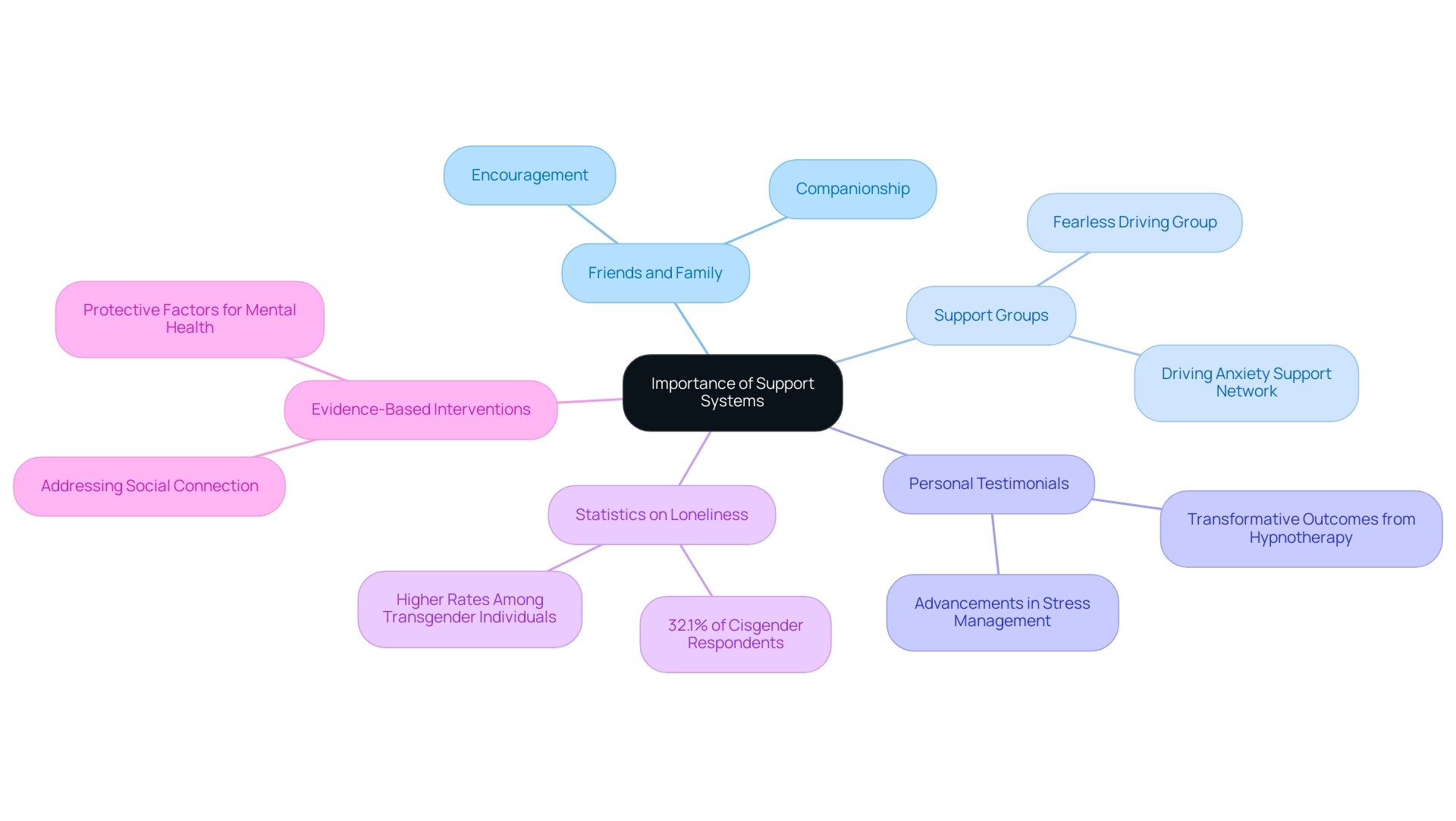
Conclusion
Driving anxiety is a significant and often shared struggle that affects many individuals, highlighting the importance of understanding its prevalence and psychological roots. By recognizing that driving anxiety is not a personal failing but rather a common emotional response, individuals can find solace in knowing they are not alone. The insights from experts and testimonials from those who have sought help underscore the effectiveness of therapeutic approaches, such as hypnotherapy and cognitive-behavioral techniques, in addressing both the symptoms and underlying causes of this anxiety.
Moreover, the role of conditioning and past experiences in shaping driving fears cannot be overlooked. By employing effective coping strategies and engaging with supportive therapeutic interventions, individuals can gradually dismantle the barriers that hinder their confidence on the road. The journey toward overcoming driving anxiety is not just about managing fear; it’s about reclaiming the freedom and joy associated with driving.
Building a robust support system is equally vital, as shared experiences and encouragement from friends, family, and support groups can foster a sense of community and connection. As individuals confront their fears, the combination of professional guidance and a nurturing support network creates a powerful pathway to empowerment. Through understanding, compassion, and the right tools, anyone struggling with driving anxiety can embark on a transformative journey toward confidence and control behind the wheel.




